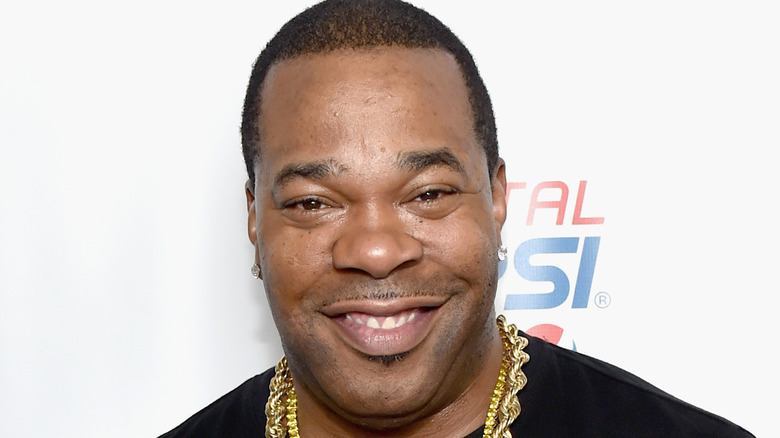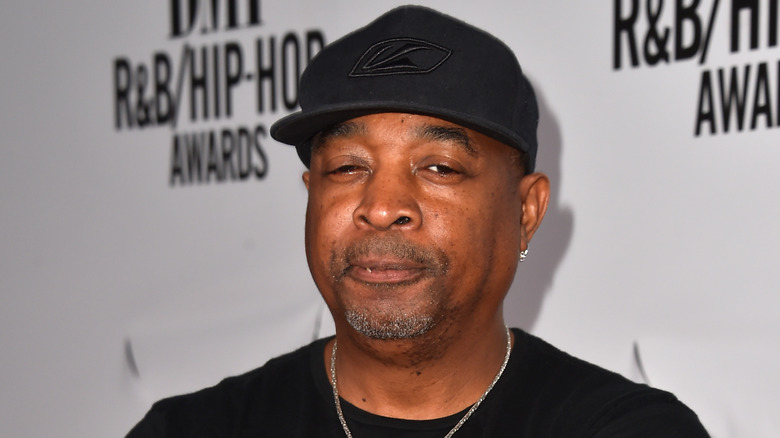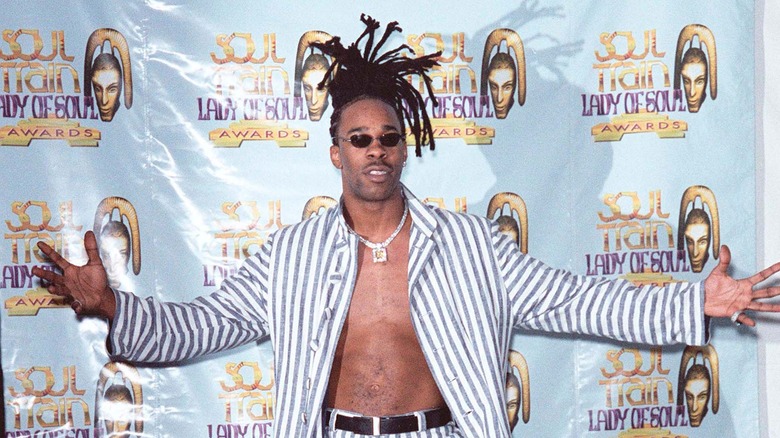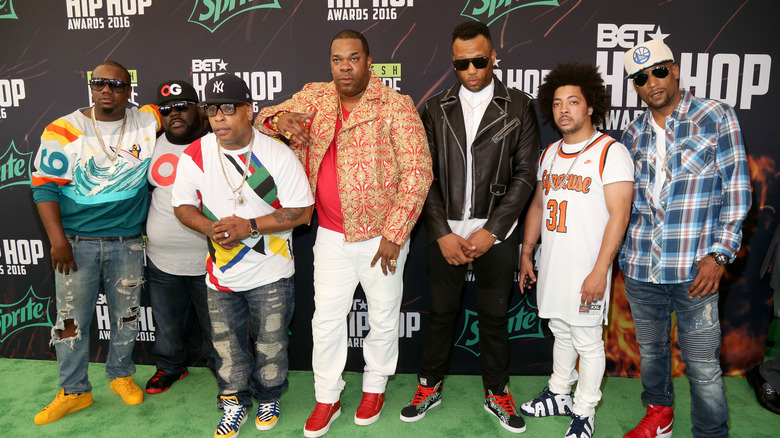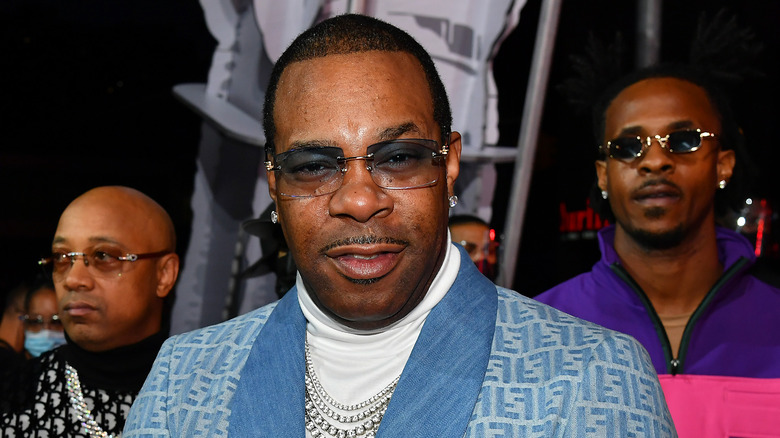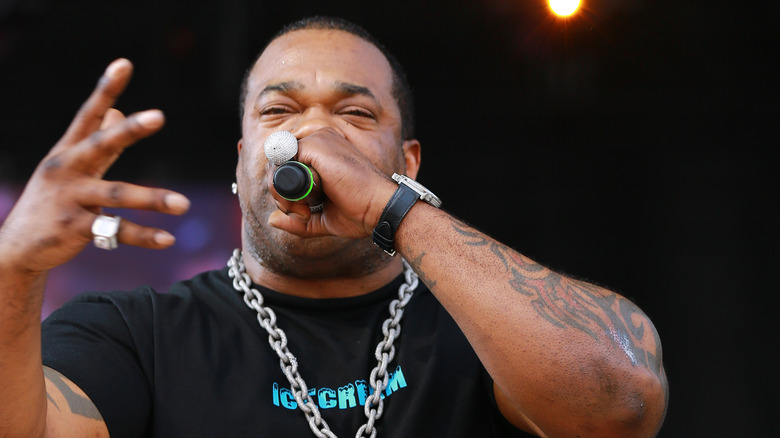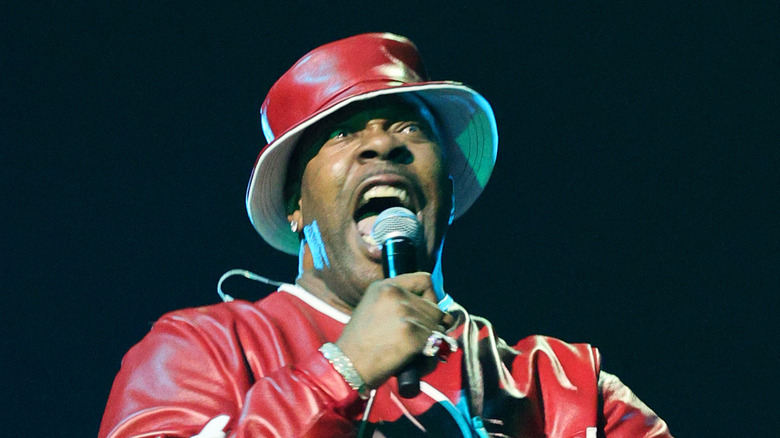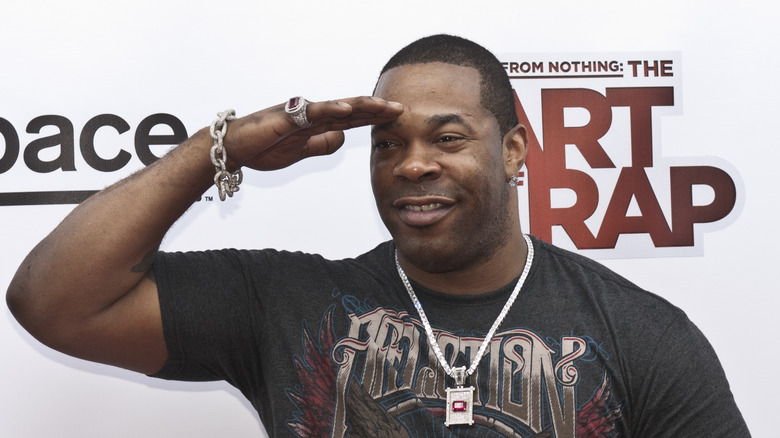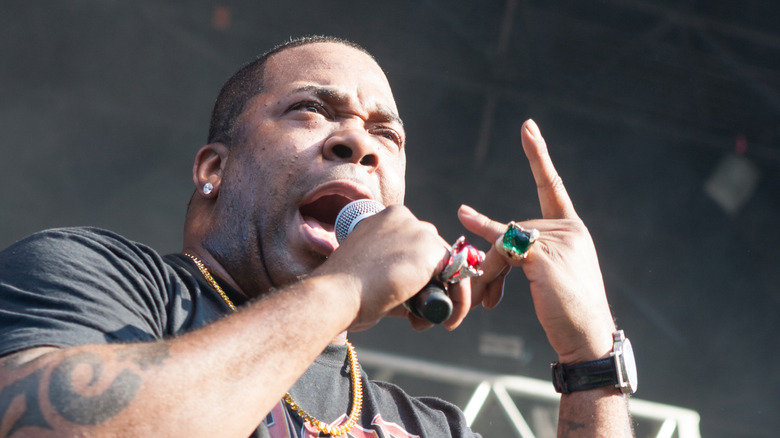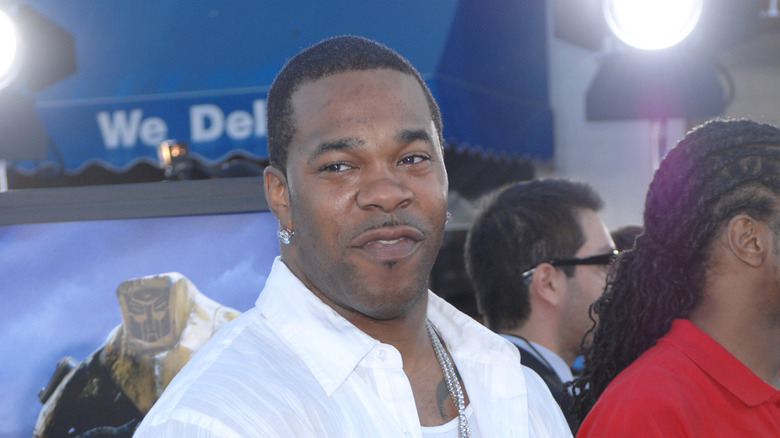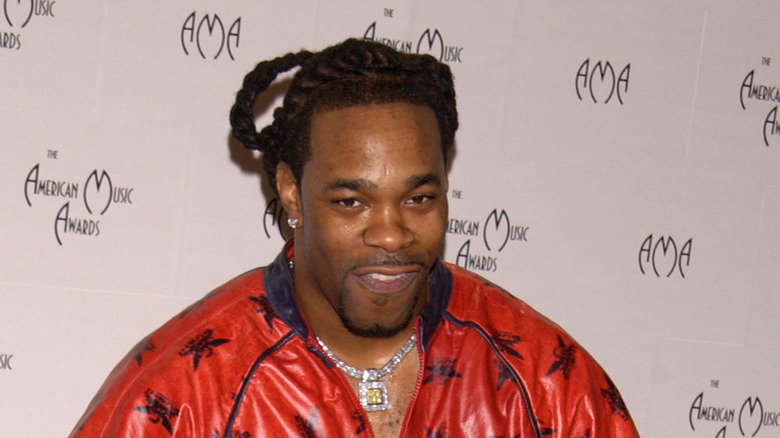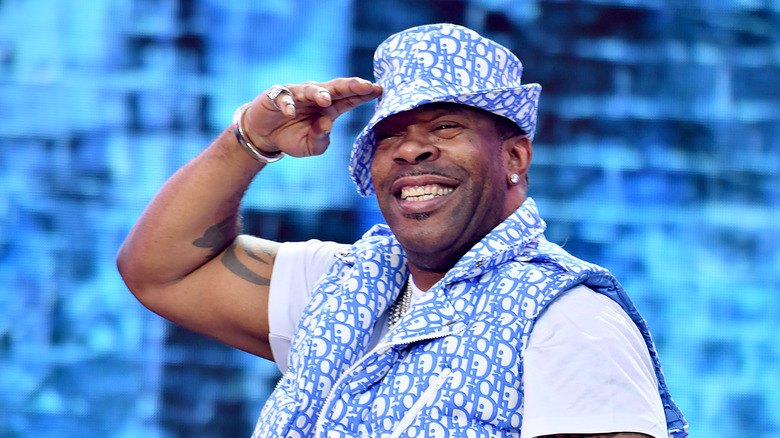The Untold Truth Of Busta Rhymes
If you've ever seen a music video by Busta Rhymes, chances are the experience stays with you. As The Boombox notes, the artist's musical and visual output has yielded some highly impressive work, from the lightning-fast flow of his debut solo single "Woo-Hah!! Got You All In Check" to the wild, whispery stylings of "Put Your Hands Where My Eyes Can See" and its "Coming To America"-inspired music video.
For a good chunk of the 1990s and the 2000s, Rhymes was a huge name — one of those borderline inescapable faces of the MTV generation, with the tunes, rapping skills, and visual hooks to back up his high visibility. As his discography (via Discogs) shows, he's still making music, too, so it's never too late to jump the "Bus" train.
However, the rapper's elaborate and sometimes almost cartoony image can mean that you might not be all that familiar with the man behind the banging tunes. Let's fix that right now by taking a look at the untold truth of Busta Rhymes.
A famous rapper came up with his name
Busta Rhymes' real name is Trevor Smith Jr., and per AllMusic, and he used to go by a slightly less punchy stage name until his mentor intervened ... and since said mentor happened to be the legendary Chuck D from Public Enemy, the younger man listened. In fact, per Vibe, Chuck D gave Rhymes more than just his artist name, too. The younger rapper has been known to describe his considerable work ethic as "CLAMP," a term coined by the Public Enemy star. Per Rhymes, it stands for "Concept, Lyrics, Attitude and Appearance, Music, and Performance."
Chuck D was highly impressed by Rhymes' performance, and since he felt it had an athletic quality, he named his protégé after Minnesota Vikings wide receiver George "Buster" Rhymes. "Yo, with this aggression that I ain't ever seen with your performance skill set, you're such a showman, it almost looks like you're playing football when you rhyming, so you should call yourself 'Busta Rhymes,'" Rhymes described Chuck D's words to him.
It soon became evident that the new name was the perfect moniker for Rhymes' particular style. so he retired his original stage name — Chill-O-Ski. "When you see me in this burst of energy, how I'm trying to bust through, it just made sense with just the way I displayed how I did my thing, you know?" Rhymes said. "So it still worked for me even without knowing about the Buster Rhymes history."
He was part of the Leaders of the New School
Busta Rhymes emerged on the music scene as part of Leaders of the New School, a rap group from Long Island, New York (per Vibe). The Leaders and their comparatively light-hearted approach reaped plenty of rewards in the early 1990s, landing them a hit — "Case of That Ol' PTA" — on their 1991 debut album (via New York Daily News). "We thought hip hop was so damn raunchy all the time oppressive," Rhymes described the group's ethos. "We needed some party, universal, happy s***. There was no unhappiness in our lives, so we were comfortable, cozy. We were able to focus on hip hop on a fun level."
Unfortunately, things were not quite as fun behind the scenes. Leaders of the New School bickered and clashed with each other, and Rhymes and fellow band member Charlie Brown were on such bad terms that they came to blows more than once. As such, the group disbanded before their second album was even out — while filming an episode of "Yo! MTV Raps," no less (via GQ).
Rhymes, a young father, was worried that the break-up might affect his income. Fortunately, his time with Leaders of the New School had already given the world his breakout performance in the form of a magnificent feature verse on The Tribe Called Quest song "Scenario," and he had plenty of high-profile friends who supported his quest to make it to the next level.
He founded the Flipmode Squad to mentor young artists
The word "flipmode" is often associated with Busta Rhymes. As Vibe tells us, the term refers to both his sub-label on Electra Records, and the collective he founded after embarking on a solo career. According to the artist, this reflected his own experiences when he was still starting out.
"Leaders of the New School, we had a bunch of artists in a clique called New School Society," Rhymes says. "Then we broke up, I start my own s***: Flipmode ... There was always a lineage. I'm always an advocate for putting out artists, breaking artists, creating legacies and careers –- and being able to pass on the information, giving them some guidance. Something that we can be proud of."
Flipmode Squad only put out one full-length album, 1998's "The Imperial" (via Discogs), and per Ambrosia For Heads, Rhymes' own ever-changing record label contracts didn't do any favors for the group's stability. However, there's no denying that the group featured a massive pool of talent ... and, in 2010, Rhymes resumed his quest to help younger artists under the name The Conglomerate. In 2018, his teams from two eras even joined forces on the "Flipmode Squad Meets The Conglomerate" single (via Vibe). Seeing as Rhymes himself received significant help and mentorship from more established artists like A Tribe Called Quest and Public Enemy, it's only natural that he's wanted to pay it forward.
He has six children and a turbulent family history
While Busta Rhymes' music and artistic persona are extremely well-known, his personal life is a little more ... well, personal. In a 2006 interview with Vibe (via Archive), Rhymes noted that he considers family an incredibly important support system. In a 2020 interview with GQ, Rhymes noted that he has six children in total, and that his eldest son has been known to work as his road manager.
Unfortunately, the family front has also brought plenty of tragedies in Rhymes' life. His first child, Tahiem, died during pregnancy — a tragic event which Rhymes told DJ Vlad coincided with some of his tougher times with Leaders of the New School. His longtime relationship with the mother of four of his children also imploded in the 2000s, due to infidelities on both their parts. "I always compromised my own happiness because family was first," Rhymes has described his approach to the failing relationship. "That was the concept that was instilled in me from young."
Rhymes' eventual separation from his former partner led to allegations of abuse on her part, which Rhymes denied. He ultimately won their lengthy custody battle in 2006 (via UPI).
If you or someone you know is dealing with domestic abuse, you can call the National Domestic Violence Hotline at 1−800−799−7233. You can also find more information, resources, and support at their website.
He's developed his own rap style
Busta Rhymes is an excellent rapper, but per Vibe, his uneven albums and "jester" reputation may have played a part in keeping him out of the "greatest of all time" discussion on occasion. Regardless, he's technically extremely adept and incredibly versatile, and he has a talent for crafty lyrics. His raspy, instantly recognizable voice and highly malleable style allow for aggressive screaming and ominous whisper-rapping alike, and per GQ, his peers aren't shy to sing his praises. "When I talk about mind-blowing, I'm talking about where you have to stop what you're doing and look at the speaker," Questlove has described hearing Rhymes' early work with Leaders of the New School. "Busta literally performs like his life and your life depend on it."
This peer appreciation, as Hot New Hip Hop points out, is evident from the way Rhymes has collaborated with many of the genre's greatest over the years. In an interview with AllHipHop, the man himself stated that he doesn't particularly concern himself with his occasional exclusion from the "greatest rapper" conversation, and noted that these collaborations alone are ample proof of his mic skills. "If you hear me on 'Flava in Ya Ear (Remix)', or 'Scenario', or whatever records you want to pull up and see me collaborate with mothaf*****, how many times you hearing a mothaf**** really saying, 'Yo, Bust got his ass whooped on this record'? I don't think you ever heard that in your life," he pointed out.
He's had plenty of trouble with the law
Over the years, Busta Rhymes has found himself in trouble with the authorities numerous times. According to Vibe, in 2003, he had an alleged confrontation with a fan, which culminated when Rhymes threw water bottles at the man. The case was ultimately resolved in 2009, and the court ordered Rhymes to pay the fan $75,000. Per The New York Times, in August 2006, Rhymes was arrested after a show in Randalls Island for possession of a machete, and for being part of a group that attacked a man who'd allegedly spat on a vehicle belonging to them. (The machete, thankfully, wasn't involved in the attack).
According to Billboard, in early 2007, Rhymes was in court for the aforementioned alleged attack, as well as another against his former driver during a pay dispute. After rejecting a plea deal that involved six months of jail time, the artist was ultimately offered a three-year probation with several other conditions — which he may have taken, considering the lack of news about him going to prison (via The New York Times). Mere months later, though, he was arrested for driving under the influence (per The New York Times).
Busta Rhymes is influenced by a particular religious movement
According to NPR, the Five Percent Nation was founded in 1963 when Malcolm X's student, Clarence 13 X, left the Nation of Islam to establish his own group. The movement's elaborate philosophy and messages of hope and empowerment have a number of supporters in the hip hop community, and according to Bustle, Busta Rhymes is one of them. Unlike the Five Percent Nation's most vocal supporters, such as the members of the Wu-Tang Clan, it appears that Rhymes hasn't spoken too much on the subject of his beliefs or attachment to the movement. However, both NPR and Bustle point out that he's at the very least familiar with the Five Percent Nation's core concepts and its philosophy, considering that his lyrics often reference them.
Rhymes is hardly the only rapper who has paid such respects to the movement, though. Apart from the Wu-Tang Clan, rap legends like Nas, Jay-Z, and Public Enemy have all been known to pen lyrics inspired by the Five Percent Nation.
Busta Rhymes has a worrying stance on sexual minorities
As outlets like Vulture and The Guardian have noted, hip hop culture has a history of less than progressive attitudes on sexual minorities. Unfortunately, it appears that Busta Rhymes is no exception to this norm, at least judging by some of his comments. According to The Washington Post, when documentary maker Byron Hurt interviewed Rhymes in 2007 and attempted to discuss homophobia in hip hop, the artist was visibly troubled by the subject. "I can't partake in that conversation," Rhymes said. "With all due respect, I ain't trying to offend nobody ... What I represent culturally doesn't condone [homosexuality] whatsoever." He then abruptly quit the interview after Hurt tried to press on the subject.
According to the New York Post (via Contact Music), Rhymes' attitudes toward LGBTQ people were also allegedly on display during his custody battle with his former partner, during which he reportedly displayed contempt over the fact that she was now in a relationship with a woman.
Busta Rhymes has cut back on alcohol
As the man behind the hit song "Pass the Courvoisier Part II," Busta Rhymes doesn't exactly come across as a man who's averse to drink. Unfortunately, he has been known to overdo it. As Cleveland 19 reports, in 2007, the artist was arrested in New York City for drunk driving. In a 2020 interview with Van Jones' "The Messy Truth," the star outright admitted that his alcohol intake — among several other indulgences — almost cost him his life.
Fortunately, the musician was able to walk back from the brink, and in a 2017 interview with The Daily Beast, Rhymes stated in no uncertain terms that he'd massively reduced his alcohol intake, especially compared to his more youthful days. "Yeah," he confirmed when asked if he's cut back. "I want to live as long as possible. I'm more health conscience [sic] now. We're just trying to balance it out. We did a lot of overdoing it when we were younger, so now we got to."
If you or anyone you know is struggling with addiction issues, help is available. Visit the Substance Abuse and Mental Health Services Administration website or contact SAMHSA's National Helpline at 1-800-662-HELP (4357).
Busta Rhymes is an accomplished actor
Due to his long and successful career as a recording artist, it can be difficult to imagine Busta Rhymes doing anything else. However, a quick glance at his IMDb page reveals that Rhymes is actually a pretty accomplished actor. Apart from various appearances of the "as himself" variety, his surprisingly robust acting career features roles in movies like "Finding Forrester," "Shaft," "Narc," and "Halloween: Resurrection."
On occasion, the artist's run-ins with the law have hindered his side gig as a thespian. In an interview with GQ, he recounted a particularly unfortunate story that happened during a time when he was tied up with a number of charges and lawsuits, and his ability to function as a free person was limited as a result.
"We actually shot this film called 'Breaking Point,' it starred me, Tom Berenger, Sticky Fingaz and Arturo Gatti, the boxer who passed away," the rapper recalled. "I had to shoot all of my scenes in Jersey, and it was a New York based film because they wouldn't get the film production a permit for me to shoot. It was extremely challenging and all of this that I was going through at the time. I just really wasn't in a good place."
A health scare caused him to reevaluate his life
In a 2020 interview with GQ, Busta Rhymes discussed a series of personal life setbacks, which culminated in his father's death in 2014. According to him, his life started to spiral "so out of control that I saw how it was starting to affect the people that I love," and he developed a number of health issues due to his lack of self-care.
After a major health scare, Rhymes decided that he had to get his health in order. According to Men's Health (via People), the artist achieved this by embarking on a strict fitness regime that involved both training and a healthy diet, and the results have both slimmed him down and improved his health dramatically. "I ain't just getting in shape to look good with my music," Rhymes said about his decision. "I was raised to protect and provide for my family and my people. I don't know how to be any other way. I have to contribute in any way I can, even if that means engaging in physicality to ensure survival."
The reason behind his decision was a particular health problem in early 2019. He found out that he had throat polyps that blocked the vast majority of his throat, which meant he risked suffocation every time he slept. Fortunately, those were dealt with, and his new lifestyle ensured that by 2020, a number of his health woes were gone.
